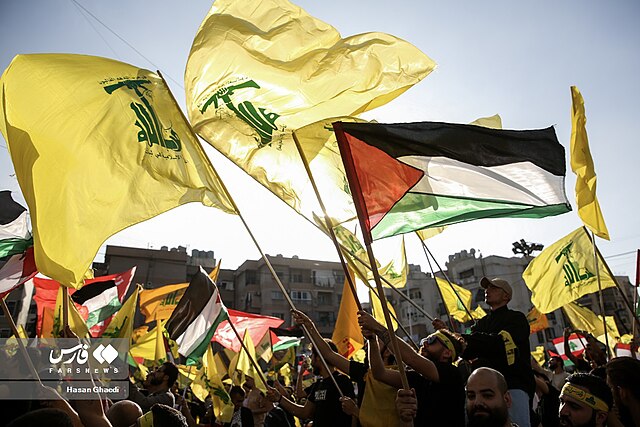Photo: Gathering during speech by Hezbollah leader Nasrallah in November -. Wikimedia Commons
Hamas' attack on Israel, on 7 October, has caused increasing tensions and risk of escalation in the region, including in the Israel-Lebanon border region. (Air) attacks back and forth are claiming lives of soldiers and innocent civilians. Hezbollah says it stands up for affiliated Hamas and their fight in Gaza. Tensions in the border area have now led to more than 100 deaths and hundreds of thousands displaced.
Situation on the ground
While eyes are on Gaza and the terrible events there, this is not the only front that has experienced escalation since 7 October. Lebanon's southern border with Israel has faced increased tensions, particularly in recent weeks. Israel and the militant movement Hezbollah are bombarding each other with rockets and drones. In total, hostilities have resulted in 140 Hezbollah fighters killed - plus 25 civilian deaths - and nearly 700 injured. 86,000 Lebanese have fled. On the Israeli side, some nine people have been killed and tens of thousands have also fled their homes.
Background
Hezbollah is a militant and political movement in Lebanon, founded as resistance movement against the state of Israel in 1982. The last time Israel and Hezbollah seriously faced each other was during the Israel-Lebanon War in 2006. Since then, there have been occasional skirmishes in the border area with rockets back and forth. Hezbollah is part of the Iran-backed network of paramilitary movements, which also includes Hamas and the Houthis in Yemen. Hezbollah's military branch is a serious player in the region with reportedly some 100,000 fighters and at least as many missiles at its disposal and is in military control of southern Lebanon. That Hezbollah launched its first attack precisely here is no coincidence. The region known as Shebaa Farms is disputed territory in the border region of Israel, Lebanon and Syria, and historical centre of tensions.
Second front?
The day after 7 October, Hezbollah opened its front with Israel, In support of Hamas. As a statement of support for Hamas' attack on Israel, Hezbollah strafed Israeli positions in the Israeli-occupied Golan Heights. Israel did not let these attacks go unheard and attacked Hezbollah infrastructure in southern Lebanon. Despite military activity in Gaza, tens of thousands of Israeli troops are stationed in the north of the country. Yet both Israel and Hezbollah say not out for wider escalation than the current assaults, fearing a regional conflict. A two-front war - three-fronts when you include the West Bank - would weaken Israel's operation in Gaza. Hezbollah also has a lot to lose and would not make itself popular at home by starting a war with Israel. The country has been torn apart by political and economic crises and the already waning popularity of Hezbollah's political wing would be at stake.
Escalation
Regional escalation threatened early this year. The south of the capital Beirut was hit by a successful drone attack on Saleh al-Arouri and six other Hamas members. Arouri was a linchpin in the ties between Hamas and Hezbollah and key figure in Hamas' armed wing - the Qassam Brigades. Until then, the disturbances had taken place only in the border area. Hezbollah saw the attack as an attack on Lebanon and the Lebanese, and an Israeli incitement to regional conflict. Israel made it clear that it was not an attack on Lebanon, nor on Hezbollah, but purely on the Hamas leadership. In its fight against Hamas, Israel does not hesitate to eliminate Hamas leaders outside its borders, including outside Gaza. Further escalation in the region became increasingly real with the Beirut attack, and an initial response from Hezbollah was anxiously awaited. Lebanon served a Complaint to the UN Security Council and Hezbollah leader Sayed Hassan Nasrallah warned that the killing would not go unpunished. A few days later, dozens of rockets were fired at an Israeli military post. Nasrallah warned that for Hezbollah no limits would be should Israel choose to start a war with Lebanon.
Hezbollah has made it clear to the continue attacks as long as the fighting continues in Gaza, in support of the Palestinian cause. And if Israel is to be believed, these will continue until Hamas is completely wiped off the map. Both sides have too much to lose to escalate the conflict, so the expectation now is that it will remain at the current 'skirmishes'. The US is conducting mediation talks between Israel and Lebanon for long-term border stability. The question is whether such a deal will be effective since Lebanon and Hezbollah are two different entities and Hezbollah will care little about a peace deal between Israel and the state of Lebanon. In addition, a possible deal depends on a ceasefire in Gaza.




